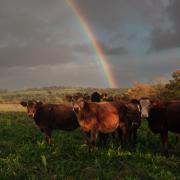South Hams local MARC COWLING deliberates the increasing fascination with lure fishing for sea bass, and how a passion has become his full-time occupation

The first time I ever saw a bass or European Sea Bass I was completely mesmerised. That glistening silver flank, intimidating dorsal fin and overall splendour shaped my early obsession with catching what is arguably the UK’s premier sporting sea fish.
Following that seminal moment, I concentrated solely on learning the why, when, where and how to consistently catch the ‘salmon of the sea’ culminating in becoming a fully insured, shore-based bass fishing guide.

Adding to their overall appeal, bass can be caught in very shallow water and extremely close to the shore – with the larger specimens preferring to inhabit parts of the coastline well and truly off the beaten track. The locations I fish and guide encapsulate Devon perfectly – remote headlands, wood-backed estuaries, rugged reefs and my favourite, those secluded coves beneath high cliffs.
Combined with their attractiveness and elusiveness, a hooked bass is a formidable opponent when hooked on a lure and the associated sporting tackle – comparable in fact, to that of a salmon or trout.

For those unaware, a lure is essentially a piece of wood or plastic developed to imitate a fleeing or wounded prey item (namely a small fish) when retrieved by the angler. With the majority of lures only weighing between 5-30g, a specifically designed light and ‘high-tech’ rod and palm sized reel is required to cast these ‘works of art’ into the desired areas.
One of the main reasons lure fishing for bass and other species such as pollack and wrasse has become so popular, is the ability to throw a couple of lures into a backpack, don your walking boots, grab the rod and reel and just head out at a moment’s notice.

This is a tremendously mobile way to partake in this wonderfully relaxing pastime, whilst exploring glorious stretches of countryside and coastline. That South Devon happens to offer some of the finest bass fishing in the country was, of course, pivotal in my decision to become a professional guide.
A high proportion of my clients live outside of Devon, with many travelling from all over the south of England, Midlands and the south East in order to experience the South Hams Area of Outstanding Natural Beauty (AONB), alongside learning the techniques required to catch these wily predators.

Indeed, I have facilitated sessions for ardent and highly determined enthusiasts, through the spectrum to complete novices, looking for an opportunity to simply relax. Indeed, an important element of what I do is that very often the application and concentration required to catch a bass means nothing else enters your mind.
Ultimately, you can completely switch off and purge your mind of those everyday pressures – even if it is just for those precious few hours. I do not fish when I am guiding, as from a safety aspect it is crucial I remain alert to the dangers of the sea, in addition to ensuring that what I am teaching allows every possible chance of catching and releasing that prize fish.

This is an exclusive way to target an exclusive sea fish, and choosing the right lure, retrieving it correctly, pointing out the types of underwater terrain bass frequent and understanding watercraft top the list of what my clients want to learn.
And this why I decided to create the South Devon Bass Guide business – to fast track people’s learning and enhance their levels of success, whilst also enabling them the opportunity to fish in stunning surroundings very rarely encountered by others. It has taken me over 30 years of fishing and exploring this truly majestic coastline to be in a position to guide others.

My own affiliation for sea fishing, coupled with the sheer enjoyment I experience from assisting a client to achieve a goal or milestone, in angling terms at least, is immensely satisfying.
Whether it’s mentoring one to one or small groups, the hugely positive reviews and testimonials I’ve received from my clients have meant I can now call my passion, my full time occupation - and for that I am extremely grateful.
Note: Due to exploitation and overfishing European Sea Bass numbers (breeding stock) are currently at a historical low.
Therefore, EU law currently dictates that all recreationally caught bass must be released during the entirety of 2018.
Ten tips for catching bass on lures
- Bass feed more confidently when the sea is rough.
- Fish all states of the tide - flood and ebb.
- Spring tides (occurring around the full and new Moon) can be more productive.
- A little murkiness to water is advantageous.
- Larger and greater numbers of bass will often be encountered in darkness.
- Dawn and dusk are also considered as excellent times to fish.
- A significant change in barometric pressure can have a positive effect.
- Learn how every one of your lures reacts when retrieved.
- In Devon, bass can be caught from March-December on lures.
- Trust your instinct - inherently, we are hunters after all!
Ten facts about the European sea bass
- Their scientific name is Dicentrarchus labrax.
- Bass are dimorphic in that females grow much larger than the males.
- Each summer, bass will return to the same stretch of coastline.
- They are a very slow growing species - a female takes six/seven years to reach maturity.
- They can be caught all around the coastlines of NW Europe.
- Bass are very territorial, often hunting to a specific timetable around the coastline.
- The British Shore Caught record is 19lb 12oz landed from Portsmouth Docks.
- Their main diet consists of small fish, squid, cuttlefish, crustaceans and worms.
- Bass can tolerate freshwater and have been caught miles from the open sea.
- They will happily hunt in water barely covering their backs.
_______________



























